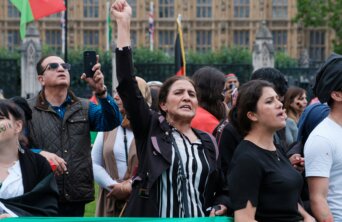- About
- Topics
- Picks
- Audio
- Story
- In-Depth
- Opinion
- News
- Donate
- Signup for our newsletterOur Editors' Best Picks.Send
Read, Debate: Engage.
| topic: | Women's rights |
|---|---|
| located: | Afghanistan, United Arab Emirates |
| editor: | Chermaine Lee |
Afghanistan’s Taliban has turned against one of its own for speaking out against the female education ban, which the United Nations calls gender apartheid.
Mohammad Abbas Stanikzai, Taliban’s deputy foreign minister, has reportedly fled the country after condemning the ban and is now staying in the United Arab Emirates. This comes after the group’s leader Hibatullah Akhundzada allegedly ordered his arrest and issued a travel ban.
In late January, Abbas Stanikzai urged Akhundzada to scrap education bans on Afghan women and girls at a religious school ceremony, saying “just as there was no justification for it in the past and there shouldn’t be one at all.”
“We are committing an injustice against 20 million people out of a population of 40 million, depriving them of all their rights.” He said in a video on social media platform X, “This is not in Islamic law, but our personal choice or nature.”
That was not the first time the outspoken minister voiced his support: After girls have been barred from secondary education, he said in a ceremony in May 2022 that the ban “deprived of the right to education.” In late 2023, the minister once again urged the leader to “reopen the doors of the educational institutions for everyone,” which he attributed as a reason for the icy relationship between Afghanistan and other countries.
There appears to be an internal debate within Taliban on this ban: In January, another minister had an emotional outburst in a public gathering as he spoke about the ban on female education. “All I know is that even if [girls’ education] is not a religious obligation or tradition, it is at least permissible,” said Mohammad Nabi Omari, deputy minister of interior, in tears.
Since the Taliban’s takeover from the US military in 2021, women and girls’ rights to education, travel and even showing up in public have been severely curtailed. Late last year, the Taliban even issued an order to disallow windows in residential buildings overlooking areas used by Afghan women.
"Seeing women working in kitchens, in courtyards or collecting water from wells can lead to obscene acts," reads the decree posted by government spokesman Zabihullah Mujahid on social media platform X.
The absurdity of these rules are matched by the situation on the ground: Although primary education is still open to girls, about one in three school-age girls have not started due to deep-rooted sociocultural norms and safety concerns related to travel. A UN Women analysis shows that by 2026, this can push the rate of early childbearing by 45 per cent and an increased risk of maternal mortality by at least 50 per cent.
Is public opposition to the education ban from a minister a glimpse of hope for women’s rights in Afghanistan? Or is this just a chess piece in a growing power battle between the two factions of the Taliban leadership and a political crisis is in the making?
While it’s too early to say, what’s for certain is that not all members in the much condemned group are for the extreme restrictions against women, nor the radical interpretation of the Quran regarding women’s role in the society.
The Taliban supreme leader’s rules harm not only women, but also whoever supports fundamental human rights.
Image by Ehimetalor Akhere Unuabona.
